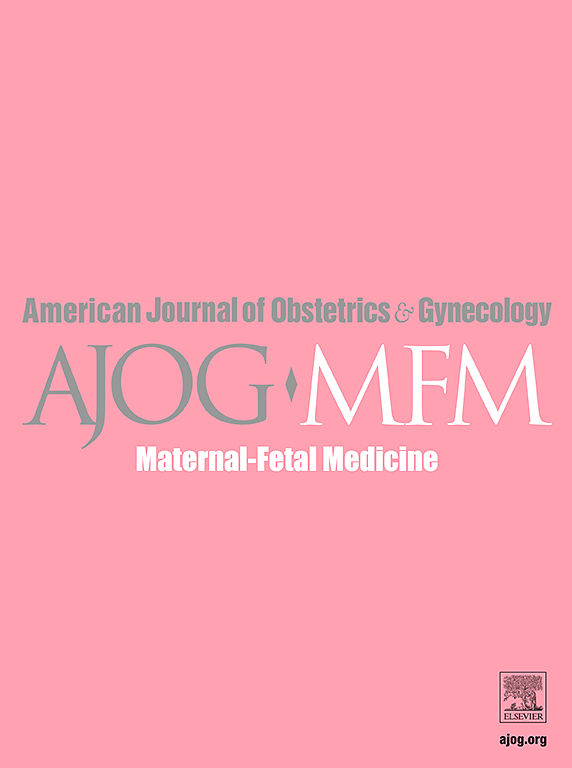Effectiveness of self-care interventions for the prevention of type 2 diabetes among women with previous gestational diabetes: a systematic review and meta-analysis
IF 3.1
2区 医学
Q1 OBSTETRICS & GYNECOLOGY
American Journal of Obstetrics & Gynecology Mfm
Pub Date : 2025-07-01
DOI:10.1016/j.ajogmf.2025.101731
引用次数: 0
Abstract
Objective
Gestational diabetes (GDM) is associated with an increased risk of developing type 2 diabetes later in life. Self-care interventions are known to prevent type 2 diabetes in high-risk populations. This systematic review aimed to investigate whether self-care interventions can prevent type 2 diabetes among women with previous GDM.
Data sources
A systematic search of MEDLINE, Embase, Cochrane Library, CINAHL, and PsycINFO was conducted on December 2, 2024.
Study eligibility criteria
Randomised, cluster-randomised, and non-randomised controlled trials that compared the effects of self-care interventions with standard/usual care or no intervention for preventing type 2 diabetes among women with previous GDM were included. The primary outcomes were the incidence of type 2 diabetes, the composite incidence of any type of diabetes, glycated hemoglobin, fasting blood glucose, blood glucose level 2 hours after the oral glucose tolerance test, and body weight.
Study appraisal and synthesis methods
Risk of bias for included studies was assessed using the Cochrane risk-of-bias tool (ROB2) or the Risk of Bias In Non-Randomized Studies of Interventions tool (ROBINS-I). Random effects models were employed for meta-analyses. The certainty of evidence was evaluated using the Grading of Recommendations Assessment, Development, and Evaluation approach.
Results
The search identified 35 trials including 6624 women. Only one randomised trial (n=1601) reported the incidence of type 2 diabetes, indicating that the lifestyle intervention focusing on diet and physical activity may have little to no effect (hazard ratio 0.89 [95% confidence interval 0.65–1.22], low certainty of evidence). The effects of self-care interventions on the other primary outcomes—composite incidence of any type of diabetes (three trials), glycated hemoglobin (three trials), fasting blood glucose (11 trials), blood glucose level 2 hours after the oral glucose tolerance test (six trials), and body weight (18 trials) were uncertain (very low certainty of evidence). Downgrading of the certainty of evidence was predominantly due to high risk of bias, imprecision, and inconsistency.
Conclusion
Available evidence on the effect of self-care interventions for the prevention of type 2 diabetes among women with previous GDM is insufficient to draw strong conclusions, necessitating further research.
自我护理干预对既往妊娠期糖尿病妇女预防2型糖尿病的有效性:一项系统综述和荟萃分析
目的:妊娠期糖尿病与以后患2型糖尿病的风险增加有关。自我保健干预措施在高危人群中预防2型糖尿病是已知的。本系统综述旨在探讨自我保健干预是否可以预防既往妊娠糖尿病妇女的2型糖尿病。数据来源:2024年12月2日系统检索MEDLINE、Embase、Cochrane Library、CINAHL、PsycINFO。研究资格标准:纳入随机、聚类随机和非随机对照试验,比较自我护理干预与标准/常规护理或不干预预防既往妊娠期糖尿病妇女2型糖尿病的效果。主要结局是2型糖尿病的发病率、任何类型糖尿病的复合发病率、糖化血红蛋白、空腹血糖、口服葡萄糖耐量试验后2小时的血糖水平和体重。研究评价和综合方法:使用Cochrane风险-偏倚工具(ROB2)或非随机干预研究的偏倚风险工具(ROBINS-I)评估纳入研究的偏倚风险。meta分析采用随机效应模型。证据的确定性采用分级建议评估、发展和评价(GRADE)方法进行评估。结果:检索确定了35项试验,包括6624名妇女。只有一项随机试验(n=1601)报告了2型糖尿病的发病率,表明以饮食和体育活动为重点的生活方式干预可能几乎没有效果(风险比0.89[95%置信区间0.65至1.22],证据确定性低)。自我护理干预对其他主要结局 - 任何类型糖尿病(3项试验)、糖化血红蛋白(3项试验)、空腹血糖(11项试验)、口服葡萄糖耐量试验后2小时血糖水平(6项试验)和体重(18项试验)的综合发病率的影响是不确定的(证据的确定性非常低)。证据确定性的降低主要是由于高偏倚、不精确和不一致的风险。结论:关于自我护理干预对既往妊娠期糖尿病妇女预防2型糖尿病的影响,现有证据尚不足以得出强有力的结论,需要进一步研究。
本文章由计算机程序翻译,如有差异,请以英文原文为准。
求助全文
约1分钟内获得全文
求助全文
来源期刊

American Journal of Obstetrics & Gynecology Mfm
Medicine-Medicine (all)
CiteScore
7.40
自引率
3.20%
发文量
254
审稿时长
40 days
期刊介绍:
The American Journal of Obstetrics and Gynecology (AJOG) is a highly esteemed publication with two companion titles. One of these is the American Journal of Obstetrics and Gynecology Maternal-Fetal Medicine (AJOG MFM), which is dedicated to the latest research in the field of maternal-fetal medicine, specifically concerning high-risk pregnancies. The journal encompasses a wide range of topics, including:
Maternal Complications: It addresses significant studies that have the potential to change clinical practice regarding complications faced by pregnant women.
Fetal Complications: The journal covers prenatal diagnosis, ultrasound, and genetic issues related to the fetus, providing insights into the management and care of fetal health.
Prenatal Care: It discusses the best practices in prenatal care to ensure the health and well-being of both the mother and the unborn child.
Intrapartum Care: It provides guidance on the care provided during the childbirth process, which is critical for the safety of both mother and baby.
Postpartum Issues: The journal also tackles issues that arise after childbirth, focusing on the postpartum period and its implications for maternal health. AJOG MFM serves as a reliable forum for peer-reviewed research, with a preference for randomized trials and meta-analyses. The goal is to equip researchers and clinicians with the most current information and evidence-based strategies to effectively manage high-risk pregnancies and to provide the best possible care for mothers and their unborn children.
 求助内容:
求助内容: 应助结果提醒方式:
应助结果提醒方式:


